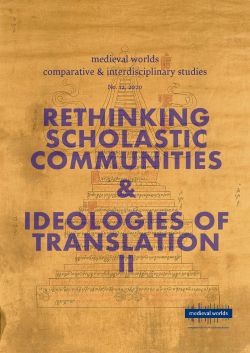Carlo Delcorno
S. 185 - 209
doi:
10.1553/medievalworlds_no12_2020s185
Verlag der Österreichischen Akademie der Wissenschaften
doi:
10.1553/medievalworlds_no12_2020s185
Abstract:
This article examines the language of an important collection of sermons by Angelo da Porta Sole, predicator generalis of the Dominican Order and Bishop of Grosseto, who preached in Tuscany in the early fourteenth century. It is a very early case of the macaronic sermon, in the wider sense of the term (not to be confused with a very particular kind of late fifteenth-century Italian preaching). Adopting the scheme proposed by Siegfried Wenzel for English macaronic sermons, this article examines three ways in which Latin and the Umbrian vernacular are combined in Angelo da Porta Sole’s sermons, namely: the insertion of a vernacular word in a Latin sentence; the presence of vernacular glosses of Latin words and etymological doublets; extended and frequent switching from Latin to the vernacular and vice versa. The last typology, which constitutes the fully macaronic mode, is frequently employed in dramatic or narrative contexts, particularly in sermons on Good Friday and at Easter.
medieval preaching; Dominicans; bilingual sermons; Latin sermons; Umbrian vernacular
Published Online:
2020/11/30 15:15:35
Object Identifier:
0xc1aa5576 0x003c0975
Rights:All rights reserved.For questions regarding copyright and copies please contact us by email.
medieval worlds provides a forum for comparative, interdisciplinary and transcultural studies of the Middle Ages. Its aim is to overcome disciplinary boundaries, regional limits and national research traditions in Medieval Studies, to open up new spaces for discussion, and to help developing global perspectives. We focus on the period from c. 400 to 1500 CE but do not stick to rigid periodization.
medieval worlds is open to submissions of broadly comparative studies and matters of global interest, whether in single articles, companion papers, smaller clusters, or special issues on a subject of global/comparative history. We particularly invite studies of wide-ranging connectivity or comparison between different world regions.
Apart from research articles, medieval worlds publishes ongoing debates and project and conference reports on comparative medieval research.
Rethinking Scholastic Communities in Medieval Eurasia
Guest Editors: Pascale Hugon and Birgit Kellner
Rethinking Scholastic Communities in Medieval Eurasia: Introduction
Pascale Hugon and Birgit Kellner
Rethinking Scholastic Communities in Latin Europe:
Competition and Theological Method in the Twelfth Century
Constant J. Mews
Rethinking Buddhist Scholastic Communities Through a Socio-Historical Lens
José Ignacio Cabezón
Myang ral Nyi ma ’od zer (1124-1192):
Authority and Authorship in the Coalescing of the rNying ma Tantric Tradition
Cathy Cantwell
Between disputatio and Polemics: Dialectics as Production of Knowledge in the Middle Ages
Bénédicte Sère
The Tibetan Institutionalisation of Disputation: Understanding a Medieval Monastic Practice
Jonathan Samuels
Ideologies of Translation, II
Hostili praedo ditetur lingua latina: Conceptual Narratives of Translation in the Latin Middle Ages
Réka Forrai
Multilingual Sermons
Guest Editor: Jan Odstrčilík
Multilingual Medieval Sermons: Sources, Theories and Methods
Jan Odstrčilík
Multilingual Texts as a Reflection of Code-Switching in Medieval England: Sermons and Beyond
Herbert Schendl
Orality in its Written Traces: Bilingual reportationes of Sermons in France (Thirteenth Century)
Nicole Bériou
Bilingualism in Medieval Italian Preaching: The Case of Angelo da Porta Sole (d. 1334)
Carlo Delcorno
Bilingual Strategies in Fourteenth-Century Latin Sermons from Catalonia
Lidia Negoi
Typology and Spectrum of Latin-Irish and Latin-English Codeswitches
in Medieval Sermon Literature
Tom ter Horst
Review Article
Review Article: How Far is Global?
Roy Flechner




 Home
Home Print
Print
 References
References
 Share
Share
